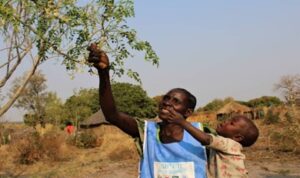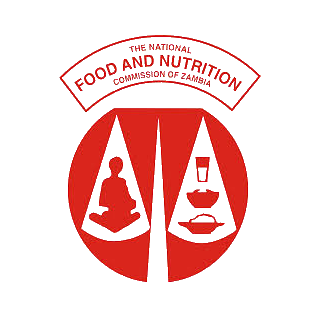 By Lwandamo Katondo
By Lwandamo Katondo
Moringa is a fast growing, drought resistant shrub. According to a nutritionist Mercy Ndaba, “the
plant’s pods and leaves are very potent in micro nutrients which are essential for the optimum
wellbeing of pregnant and lactating mothers as well as children who fall within the 1000 days
window of age and must benefit from consuming the plant. Every part of the plant is a source of
important vitamins and minerals such as calcium, potassium, zinc, magnesium, iron and copper
among others.”
In Kalabo district of Western province, pioneer households comprising of pregnant and lactating
mothers have started enjoying the nutritional benefits of consuming the moringa plant following
a successful harvest.
Moya Ndopu, 45, of Mushukula village in Ndoka ward is a mother of six children the youngest
being a 1-year-seven month old boy who is currently on complimentary feeding. Ms Ndopu who
is breastfeeding and also a Nutrition Support Group volunteer has explained that moringa is a
multi-purpose herb which is an effective remedy against child stunting as well as other forms of
malnutrition and that it also repels several common health conditions which affect mothers and
children.
“The nutritional benefits of moringa are amazing. By consuming moringa, my family is now
healthy and no longer suffers from eye diseases, diarrhea and other illnesses which used to be
common among household members, particularly the children. I have also observed that this
wonderful plant helps children enhance their cognitive development,” she noted.
Ms Ndopu explains that the plant’s pods provide her household with delicious beans while the
leaves are a good source of vegetables.
“Moringa is a highly nutritious and rich source of vital micro nutrients such as vitamins and
minerals. We consume the leaves fresh as vegetables, dry and pound them into powder which is
used as a spice or mixed with porridge to feed the baby while the pods are a good source of
beans. We also brew an organic drink from moringa by stirring fresh leaves in a cup of hot
water,” says Ms Moya as she expressed her joy.
The Department of Forestry in the district has taken note of the success story of consuming
moringa products. To that effect, the department has embarked on the distribution of 2,200
moringa seedlings among 396 pregnant and lactating household mothers in a bid to improve
nutrition among children who fall within the 1000 days window of human life.
This nutrition intervention has complimented previous but similar measures such as the one
pioneered by a non-governmental organization People In Need (PIN) who distributed 6,000
moringa seedlings to 263 households and three schools in Ndoka ward under the Women In
Innovation (WIN) community intervention program. The objective of the community
intervention was to enable beneficiaries use moringa for household consumption, livestock
production, fertilizing gardens and generally appreciate the importance of growing trees in a
changing climatic environment.
Ngebe Muyombo of Mushukula village in Ndoka ward is another household mother beneficiary
and pioneer of moringa consumption. The 35-year old pregnant mother now shares her insights.
“My 5-year old girl has good health because she consumes moringa. I prepare different recipes
for her. She was only less than a year old when I planted the seedlings. Having experienced the
nutritional value of moringa, I wish to implore every mother to plant this shrub and consume its
produce in order to ensure optimum health among mothers and children,” she recounts.
Ms. Muyombo further recounts the process of nurturing moringa and the plant’s social-economic
value.
“Every part of the moringa plant is suitable for either commercial or nutritional purposes. I’m
very grateful to PIN who in 2018 provided us with moringa seedlings free of charge so that we
improve our social-economic wellbeing. We only received limited training in management,
harvesting, processing and various uses of the plant. But due to lack of detailed technical
knowledge as well as capacity building in terms of management, expansion and processing,
we’re still cultivating the plant at a subsistence level with the harvest only catering for home
consumption,” she said.
Ms. Muyombo has further bemoaned that the lack of advanced technical knowhow has resulted in
her only managing to raise a few shrubs around her homestead despite the plant’s huge social economic
demand and nutritional value available on the market. She has since called for
technical support in a bid to help the household mothers plant the shrub at a large scale, increase
yields and achieve high nutritional impact.


